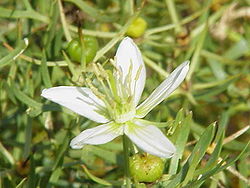
Harmala alkaloids are several alkaloids that act as monoamine oxidase inhibitors (MAOIs). These alkaloids are found in the seeds of Peganum harmala (also known as Harmal or Syrian Rue), as well as Banisteriopsis caapi (ayahuasca), leaves of tobacco[1] and coffee beans.[2] The alkaloids include harmine, harmaline, harmalol, and their derivatives, which have similar chemical structures, hence the name "harmala alkaloids". These alkaloids are of interest for their use in Amazonian shamanism, where they are derived from other plants. Harmine, once known as telepathine and banisterine, is a naturally occurring beta-carboline alkaloid that is structurally related to harmaline, and also found in the vine Banisteriopsis caapi. Tetrahydroharmine is also found in B. caapi and P. harmala. Dr. Alexander Shulgin has suggested that harmine may be a breakdown product of harmaline.[3] Harmine and harmaline are reversible inhibitors of monoamine oxidase A (RIMAs). They can stimulate the central nervous system by inhibiting the metabolism of monoamine compounds such as serotonin and norepinephrine.
The harmala alkaloids occur in Peganum harmala in concentrations of roughly 3%, though tests have documented anywhere from 2–7% or even higher,[4] as natural sources tend to vary widely in chemical makeup. Harmala alkaloids are also found in the Banisteriopsis caapi vine, the key plant ingredient in the sacramental beverage ayahuasca, in concentrations that range between 0.31 and 8.43% for harmine, 0.03–0.83% for harmaline and 0.05–2.94% for tetrahydroharmine.[5] Although other psychoactive plants are occasionally added to ayahuasca to achieve visionary states of consciousness, the recipes vary greatly and no single combination is common. Peganum harmala, normally consumed as a tea or used as an incense, is mentioned in classical Persian literature both as a sacred sacrament and as a medicine. The harmala alkaloids are not especially psychedelic, even at higher dosages, when hypnagogic visions, alongside vomiting and diarrhea, become the main effect.
Harmala alkaloids are also found in many other plants, such as Passiflora. The leaves of P. incarnata have been reported variously to give 0.005%, 0.12%, and 0% harmala alkaloids.[6]
- ^ Kivell BM, Danielson K (2016). Neuropathology of Drug Addictions and Substance Misuse. Elsevier.
- ^ Herraiz T, Chaparro C (18 January 2006). "Human monoamine oxidase enzyme inhibition by coffee and beta-carbolines norharman and harman isolated from coffee". Life Sciences. 78 (8): 795–802. doi:10.1016/j.lfs.2005.05.074. PMID 16139309. Retrieved 21 November 2023.
- ^ Shulgin A, Shulgin A. "#13. HARMALINE". Tryptamines i Have Known And Loved: The Chemistry Continues. Erowid.
- ^ Herraiz T, González D, Ancín-Azpilicueta C, Arán VJ, Guillén H (March 2010). "beta-Carboline alkaloids in Peganum harmala and inhibition of human monoamine oxidase (MAO)". Food and Chemical Toxicology. 48 (3): 839–45. doi:10.1016/j.fct.2009.12.019. hdl:10261/77694. PMID 20036304.
- ^ Callaway JC, Brito GS & Neves ES (2005). Phytochemical analyses of Banisteriopsis caapi and Psychotria viridis Journal of Psychoactive Drugs 37(2): 145-150.
- ^ Dhawan K, Dhawan S, Sharma A (September 2004). "Passiflora: a review update". Journal of Ethnopharmacology. 94 (1): 1–23. doi:10.1016/j.jep.2004.02.023. PMID 15261959.